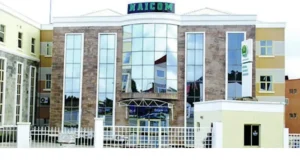
THERE are indications that telecommunications firm, MTN, has paid for the Fifth-Generation (5G) network license in Nigeria, ahead of the February 24 deadline given to winners of the 3.5GHz spectrum auction.
MTN and Mafab Communications emerged winners of the two lots of 100MHz of the 3.5GHz spectrum to be deployed for 5G network in Nigeria at the auction process organised on December 13, 2021, by the Nigerian Communications Commission (NCC) in conjunction with the Ministry of Communications and Digital Economy, in Abuja.
The two firms were expected to pay $273.6 million before the deadline. MTN as the highest bidder paid an additional $15,900,000 to pick the first lot in the 3500MHz-3600MHz to emerge as the first preferred bid winner.
Though the NCC is yet to announce officially, an industry source close to NCC, monitoring the situation of the process told this medium that MTN made the payment two weeks ago. This was later confirmed by an official of the telco. Speaking anonymously, she said, “MTN has cleared the 5G bill, the regulator should announce when it deems it ready.”
Also on the NCC website, MTN was listed among those which had paid their licence fees in full and had collected licence documents for the respective telecommunications undertaking before the era of reclassification of Licences into Class and Individual licences.
As stated on the NCC website, the licence secured by MTN is in the individual category. An Individual Licence is a type of authorisation in which the terms, conditions and obligations, scope and limitations are specific to the service being provided.
Process of licensing can take the form of Auction, “First Come First Served”, “Beauty Contest” or a standard administrative procedure, among others.
Though nothing much has been heard about Mafab Communications, checks however showed that the licensee is sure of making payment before the deadline.
We learnt that Mafab is hoping to raise $350 million via equity to finance the spectrum license cost and other associated project costs.
Mafab Communications is an indigenous company incorporated in 2020 and licensed to provide and operate local interconnect and international carrier services. The Company is currently a subsidiary of Althani Group of Companies Limited, a company established 15 years ago with a yearly turnover of over $450 million. The company also holds an operational interest in banking, banking, insurance, hospitality and telecommunication spheres of the Nigerian economy.
According to the information gathered, Mafab Communications has set a five-year target, which would see it deploy into over 6,000 sites in the country. In the first year of deployment, Mafab is targeting 1.5 million subscriber growth from 1000 sites rollout; to increase to three million from 3000 sites by year two.
By the third year, the firm is looking at 4000 sites and five million customers; the fourth year would see 5000 site rollouts, six million users and by the fifth year, site rollout should have increased to 6000 and a subscription base of 7.5 million.
MEANWHILE, MTN Nigeria has told its customers they will now be required to provide their Virtual NIN or the improved NIN slip for all SIM related services.
The company disclosed this in a vNIN update flier. According to the company SIM registration, replacement, mobile number portability, NIN linking, and 4G upgrade can only be done with vNIN or the improved NIN slip.
It said: “vNIN is a tokenised version of a person’s actual NIN, it is a 16-digit alphanumeric (ABCXYZ1249872DK…) NIN that customers will be required to generate either via NIMC mobile App, via the improved NIN slip with QR code for scanning using the NIMC mobile app or USSD channel for any SIM related services.
“The virtual NIN tokens are merchant-specific and expire after a set period of time (usually 72 hours). This means that a token generated for company MTN cannot be used or verified by company Airtel.”
According to MTN, it is adopting vNIN because the Federal Government introduced it as a means to protect citizens’ data privacy as another party verifying the number cannot retain or use it in a way that puts the individual’s data privacy at risk.






